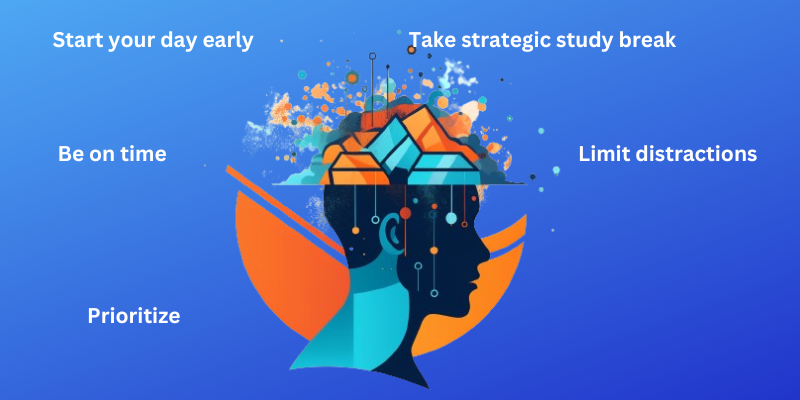In today’s fast-paced world, where demands on our time seem to be ever-increasing, the quest for maximum efficiency in our daily lives has become a top priority. Whether you’re a student, a professional, an entrepreneur, or someone trying to balance work and personal life, optimizing your day can significantly improve productivity and overall well-being. In this comprehensive guide, we’ll explore various strategies and techniques to help you make the most of every day.
Understanding the Importance of optimizing your day
Efficiency is all about achieving the highest level of output with the least amount of input—whether it’s time, effort, or resources. When you optimize your day for efficiency, you accomplish more in less time, reduce stress, and create space for personal growth and leisure. Here’s why it matters:
1. Greater Productivity:
Efficiency enables you to complete tasks and projects faster, giving you more time to tackle other important activities.
2. Reduced Stress:
A well-optimized day reduces the rush and panic that often comes with time constraints, leading to a calmer and more relaxed state of mind.
3. Work-Life Balance:
Efficiency helps you strike a better balance between work, family, and personal time, improving overall quality of life.
4. Enhanced Focus:
When you have a clear plan and prioritize tasks, it becomes easier to maintain focus and avoid distractions.
5. Achievement of Goals:
Efficiency propels you closer to your goals by ensuring you consistently work toward them.
Now, let’s delve into practical strategies to optimize your day for maximum efficiency:
1. Start with a Morning Routine
Your morning routine sets the tone for the rest of the day. Begin with activities that boost your energy and motivation. Consider incorporating elements such as:
- Exercise: Physical activity in the morning enhances alertness and overall well-being.
- Meditation or Mindfulness: Practicing mindfulness helps reduce stress and improve concentration.
- Healthy Breakfast: A nutritious breakfast fuels your body and brain for the day ahead.
2. Prioritize Tasks with the Eisenhower Matrix
Use the Eisenhower Matrix to categorize your tasks into four quadrants:
- Urgent and Important: These tasks should be tackled first.
- Important but Not Urgent: Schedule these for later.
- Urgent but Not Important: Delegate or automate if possible.
- Not Urgent and Not Important: Minimize or eliminate these tasks.
This matrix helps you focus on high-priority items while minimizing time spent on less important ones.
3. Create a To-Do List
A to-do list is a simple yet powerful tool for organizing your day. List your tasks and prioritize them based on importance and deadlines. Break larger tasks into smaller, more manageable sub-tasks. Consider using digital task management apps to help you stay organized.
4. Time Blocking
Time blocking involves allocating specific time slots for different tasks or types of work. This method ensures that you dedicate focused time to each activity and avoid multitasking. For instance, allocate a block of time for meetings, another for creative work, and yet another for emails and communication.
5. Limit Distractions
Identify common distractions in your work environment and take steps to minimize them. This might include silencing your phone, turning off notifications, and creating a clutter-free workspace. Consider using website blockers to prevent access to distracting websites during work hours.
6. Set Realistic Goals
Setting achievable goals helps maintain motivation and a sense of accomplishment. Break your day into sections and allocate goals to each one. Ensure your goals are specific, measurable, and time-bound (SMART).
7. Embrace Technology
Leverage technology to streamline tasks and save time. Use productivity apps for tasks like time tracking, note-taking, and project management. Automation tools can handle routine tasks, freeing you up for more important work.
8. Learn to Say No
It’s important to recognize your limits and avoid overcommitting. Politely decline requests or tasks that don’t align with your priorities or availability. Saying no helps you protect your time and energy for what truly matters.
9. Take Regular Breaks
Breaks are not a sign of laziness but a necessity for maintaining focus and productivity. Short, frequent breaks can rejuvenate your mind and prevent burnout. Try techniques like the Pomodoro Technique, which involves 25-minute work intervals followed by 5-minute breaks.
10. Reflect and Adjust
At the end of each day or week, take time to reflect on what went well and what could be improved. Adjust your strategies and routines based on this reflection to continually refine your efficiency.
11. Stay Organized
Keep your physical and digital spaces organized. Use tools like calendars, notebooks, and folders to manage information and tasks effectively. The less time you spend searching for things, the more productive you become.
12. Get Adequate Sleep
Efficiency is closely tied to your physical and mental well-being. Ensure you get enough sleep to stay alert and focused during the day. Quality sleep is a cornerstone of productivity.
13. Continuous Learning
Invest time in learning new skills and strategies for efficiency. Stay updated with the latest tools and techniques that can further optimize your day.
Conclusion
Optimizing your day for maximum efficiency is an ongoing process that requires commitment and self-awareness. By implementing these strategies and customizing them to your needs, you can achieve higher productivity, reduced stress, and a better work-life balance. Remember that efficiency is not about working longer hours but working smarter. Start implementing these changes today, and watch your days become more productive and fulfilling.
